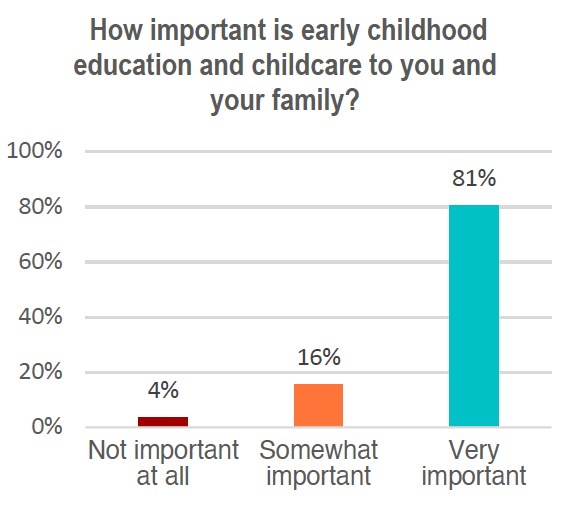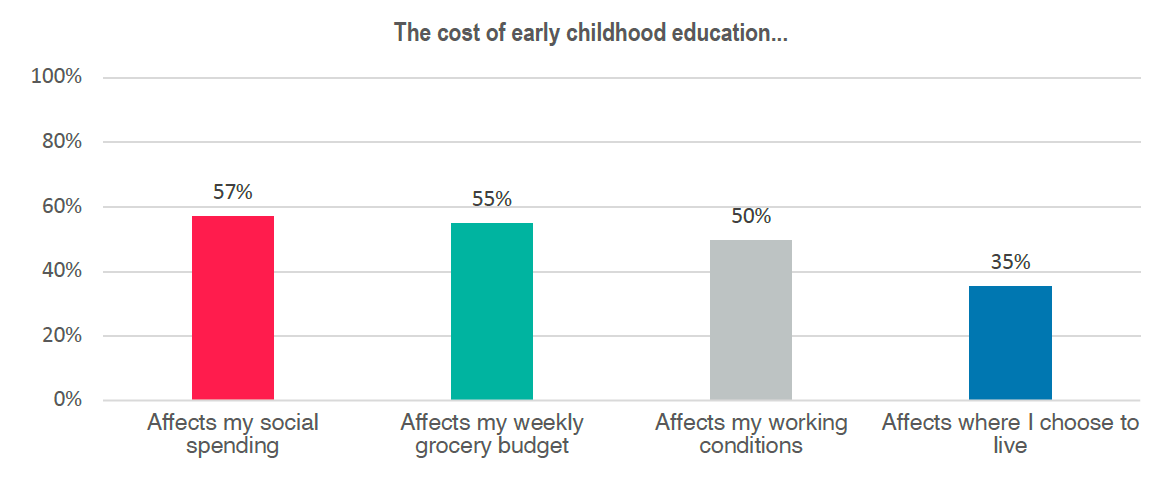This week we released findings from a survey of over 1000 parents and carers of young children who shared their experiences with early childhood education and care (ECEC) during COVID-19.
In our first analysis of the results, we found that 97% of families think ECEC is important, with 81% saying it is very important. Parents and carers who have had their employment impacted by COVID-19 and are looking for jobs value ECEC the most.

Families are relying on ECEC
The findings clearly show that parents and carers are relying on ECEC for their children’s education and wellbeing while they try to continue working, find new jobs and respond to change caused by COVID-19. Government anticipated this need early on in the pandemic and removed attendance fees to encourage more families to access ECEC.
This temporary arrangement assisted many families to maintain some stability while they were facing challenges like employment uncertainty, restricted access to support networks and disruption to their children’s learning and development.
“Excellent initiative gave us both the ability to look for and start alternative work after being stood down...”
“It has been amazing as my child has been able to access more care so therefore, I can work longer.”
Whether or not families continue ECEC attendance once we return to a system where they are required to pay fees remains to be seen.
Affordability is important
Cost is a significant consideration for families when deciding to send their children to early learning centres. We found that ECEC fees affect the ability of parents and carers to support basic needs like getting food on the table; and this impacts low-income families the most. Fees affect working conditions for parents and carers, such as how many hours they can work, how much flexibility they need, where they can work and how much they earn. It also impacts their ability to contribute to economic growth through spending money on social activities that support the tourism, hospitality, sports, arts and cultural sectors.

Families have a greater appreciation of ECEC
While affordability remains a challenge, families have developed a deeper understanding of the importance of high quality early learning, and a stronger appreciation for the skilled professionals who deliver it. Interestingly, when asked what they value most about ECEC more parents and carers said they value the opportunities that ECEC provides for their children’s learning and development over opportunities for work and study.
“Myself and my wife are not natural teachers and found our children struggle to concentrate on what was asked. A professional influence was needed.”
“Had taken child out of care whilst school was on hold. Child now back in care much better for their well-being, social activity, routine and learning in preparation for school. Juggling full time work, at home teaching and care for small child too difficult too [sic] provide the quality of care they'd get at daycare.”
How to improve experiences for families
Our findings show that we need to iterate the funding model to ensure that families can continue their children’s early learning and development, especially families who are experiencing disadvantage.
Last month I shared The Front Project’s recommendation for ECEC funding, which offers some solutions to ensure high-quality and affordable early learning as we recover from COVID-19. Our recommendation to amend the subsidy to include a new 'taper rate' would make ECEC more affordable for families and free for vulnerable and disadvantaged children.
This would assist centres to continue providing a stable environment for children as we aim to grow employment, help more parents and carers – especially women – participate in the workforce and provide a foundation to further strengthen our ECEC sector.
